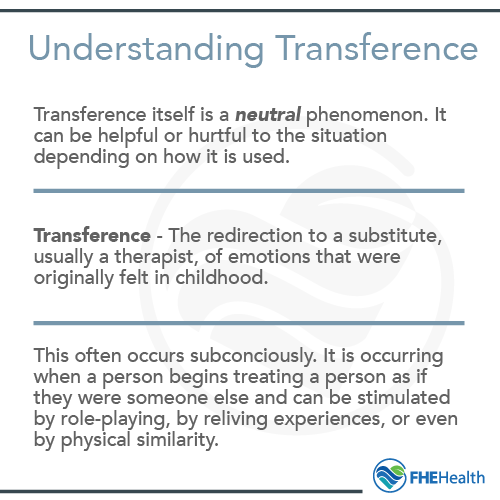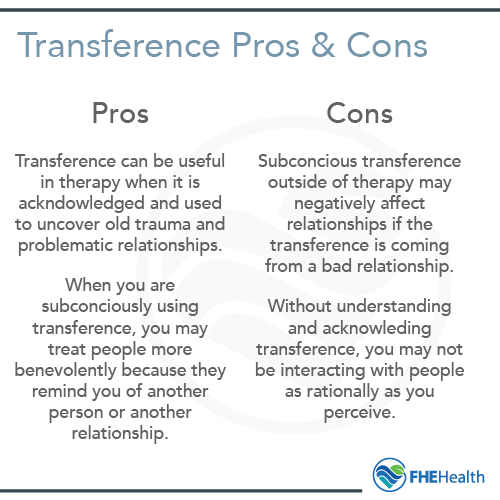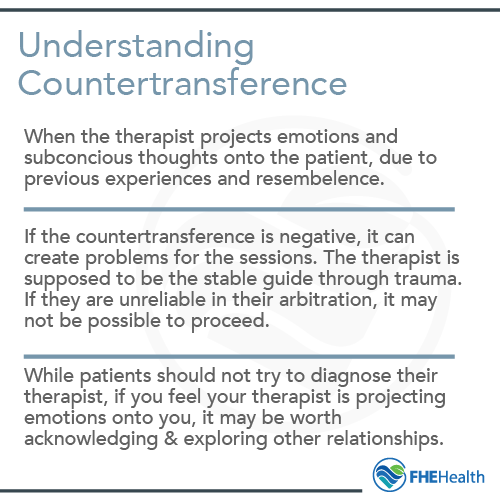
Psychoanalytic theory introduced the concepts of transference and countertransference. Today, clinicians use these terms across disciplines and theories to describe the relationship dynamics between professionals and the people they treat. High success rates suggest that psychotherapy can aid clients with depression, anxiety, PTSD, addiction and other issues. Counselors often dig into their clients’ pasts and encourage self-reflection to find the root of their illnesses.
As they dive into their history, some clients discover hidden emotions — such as fondness, rage, disappointment, frustration and grief — for people in their past. These thoughts can manifest in unconscious ways that clients don’t notice until their counselor points them out. Learning about transference could help you maintain your progress and build positive relationships with the people in your life. Read on to understand more about countertransference, its meaning, and how it impacts therapy.
Transference and countertransference are big words, but they’re relatively simple concepts that explain a lot of what happens in our daily interactions with people, including our family, friends and even the strangers we talk to at the coffee shop and grocery store. Here’s what you need to know about transference and how it works both inside and outside of therapy.
Understanding Transference

Transference involves projecting feelings about a person from your past onto someone else. Typically, transference is an unconscious act. You might like or dislike someone for seemingly no reason or have familiar feelings toward them even though you met them recently.
Transference can influence how you treat people. If you associate someone with a warm, loving relative, you might be friendly and kind. Conversely, if you associate someone with a cold authority figure, you could avoid them and shrink away when they interact with you.
Many people experience maternal, paternal or sibling transference, where they project emotions that they have about a relative. Others experience non-familiar transference unrelated to family members or erotic transference that involves crushes and sexual attraction.
People can transfer feelings to strangers — like seeing a retail worker as a favorite aunt — in addition to friends, employees and coworkers. Transference can also lead to stereotyping when someone makes assumptions about a group after interacting with one person.
Everyone experiences transference to an extent, but it becomes a problem when it interferes with their ability to socialize. They might lash out at people, get too attached or express prejudices that ruin their relationships with others.
Classic Transference
The term transference was originally used in the field of psychoanalysis and was defined as “the redirection of feelings and desires and especially of those unconsciously retained from childhood toward a new object.” In layman’s terms, this means that you project your feelings about someone from your past, such as a parent, onto another person in your life, like your boss. Transference is also common with stereotypes. For example, if you had a bad experience with a doctor, you may automatically assume all doctors are like that.
Therapeutic Relationship Transference
This is a more casual use of the word that counselors and therapists may use with each other to indicate the healthiness of their therapeutic relationship with a client. In this case, transference is a positive thing and is seen as an indication that the therapist and client have good communication and rapport.
Erotic Transference
While this is more of a subset of classic transference, it is something that most people associate with the term. In erotic transference, the client’s positive feelings toward the therapist continue to evolve, turning into a romantic interest. This is a negative thing for the therapeutic relationship, as it can change the trajectory of the sessions and make it more difficult to continue to make progress. It often results in the client needing to find a new therapist to continue with.
Is Transference Bad?
Transference can be helpful in therapy because it forces you to look at your subconscious beliefs. If you feel negatively toward your therapist because they remind you of a parent, for example, you might discuss what caused these feelings. Why do you dislike people who remind you of this parent? What childhood conflicts caused these feelings?
Similarly, transference can generate positive thoughts toward a person. You might feel closer to a friend because they remind you of your favorite teacher, or you could be attached to your therapist because they’re kind like your grandmother.
Transference can be bad when it creates negative thoughts. If you transfer dislike, discomfort or rage to your therapist, you’ll argue with them or ignore what they say, which hinders your progress. The therapist might dislike you, in turn forcing you to seek out another counselor.
Transference can also create unfair expectations if you associate one person with another and want them to behave accordingly. If you start seeing a friend as a mother, for instance, you might get angry when they don’t fulfill that role. Your counselor may remind you that you can’t expect someone to act like an individual from your past.
Transference in the Outside World and Its Effects
 Transference happens quite a bit in our everyday lives outside of therapy. Whether it’s the old lady at the grocery store you’re much nicer to than everyone else because she reminds you of your grandmother or the professor you don’t like because he adjusts his glasses just like your dad, transference is a normal part of life. However, even in cases where it causes you to have positive feelings about someone, it may not be a good thing when it comes to healthy relationships and your own well-being.
Transference happens quite a bit in our everyday lives outside of therapy. Whether it’s the old lady at the grocery store you’re much nicer to than everyone else because she reminds you of your grandmother or the professor you don’t like because he adjusts his glasses just like your dad, transference is a normal part of life. However, even in cases where it causes you to have positive feelings about someone, it may not be a good thing when it comes to healthy relationships and your own well-being.
Transference can keep you from getting to know people or developing deeper relationships if you’re projecting someone else’s negative qualities onto them. You may not be open to a new romantic relationship just because your last ex cheated on you, or it can keep you from being willing to better yourself, because you’re scared to put yourself out into new situations, because previously it hasn’t worked out.
Even in situations where transference is a positive thing, it keeps you from being able to really and truly know and relate to someone because you’re always viewing them through the lens of someone or something from your past instead of seeing and appreciating them for who and what they are.
Transference in Therapy
While transference outside of therapy may not be the best thing, inside a therapeutic setting, it can actually be a critical tool to help process the reasons why you relate to people like you do and move on to healthier coping skills and social interactions.
Transference in therapy works like this: You project those feelings from your past onto the therapist, and it affects how you interact and the communication you have. This, in turn, gives the therapist a unique perspective in understanding you and can increase their ability to lead you through those harmful thoughts and behavior patterns.
Ideally, you will be aware of the transference and can communicate how you’re feeling and why to the therapist. It may seem odd to be open about this, but it’s an expected part of therapy, and many people find that once they are able to recognize the transference and the why behind it, they’re able to start making significant steps toward healing and a better life. Through this, the therapist can also help you see where transference might be an issue in your other relationships and give you tools to address it.
Signs of Transference in Therapy
Common examples of transference and countertransference in therapy include:
- Biases: One person irrationally dislikes the other or makes unfair assumptions.
- Strong emotional reactions: An individual blows up at another for seemingly no reason, implying that they have buried feelings toward another person.
- Misplaced feelings: One person tells the other what they want to tell someone from their past, such as “Stop trying to control me!”
- Inappropriate thoughts: An individual develops a crush or feels sexual attraction to the other person.
- Preoccupations: The individual can’t stop thinking about the other person after their session, suggesting they’ve formed an unhealthy attachment.
Good counselors use transference as a tool instead of taking it personally. They might ask the patient what triggered their response and how it ties to previous events. If the counselor can’t overcome their own subconscious biases, they might recommend a different therapist.
Understanding Countertransference
 Countertransference is another phenomenon that can happen in therapy, but it is less common. In this situation, it’s the therapist who is projecting their conflicts onto the client. An example of this could be a therapist who went through a painful divorce, assuming that all her client’s romantic relationships are doomed. As with transference, however, it can also be positive and help the therapist develop a better relationship with his or her client.
Countertransference is another phenomenon that can happen in therapy, but it is less common. In this situation, it’s the therapist who is projecting their conflicts onto the client. An example of this could be a therapist who went through a painful divorce, assuming that all her client’s romantic relationships are doomed. As with transference, however, it can also be positive and help the therapist develop a better relationship with his or her client.
Countertransference in therapy can present many difficulties and is something to be on the lookout for as a client. If the countertransference is negative, it can make it difficult for the client to be able to make progress in the sessions. Even if the countertransference is positive, it can still be problematic if the therapist doesn’t want to challenge or push the client to grow.
Ways to Manage Transference
Therapists can manage transference by setting boundaries. If a client views the therapist as a best friend, parent or romantic partner, the counselor should accept the situation while maintaining a professional distance. They can help their patient without getting emotionally involved or treating them like a close friend.
Setting boundaries can include declining gifts or tips, sticking to scheduled sessions, maintaining a physical distance, avoiding giving out personal information, clarifying intent and communicating through professional channels, not text messages or social media. Clients should respect these boundaries so their counselor can provide objective, effective advice.
Therapists can talk to their peers when they get overwhelmed so that they don’t take their frustrations out on their clients. Support groups help them manage triggers and examine biases. They can also get professional advice from colleagues who have been in similar situations. Taking these precautions can help to avoid the possibility of transference.
For their part, patients can practice self-reflection outside of therapy sessions to uncover hidden feelings. They could meditate, practice mindfulness or journal their thoughts. Their counselor might recommend communicating with individuals from their past or learning how to let go of trauma. Once they’ve uncovered them, clients can start dealing with their subconscious desires.
Improving Your Well-Being
If you think that transference is an issue in your life, dealing with it in the appropriate therapeutic setting can help you better understand yourself, give you the tools to reframe your relationships and find more balance in your life. As you work through transference with a therapist, it can be helpful to journal or take notes on your feelings and the topics discussed in your sessions, allowing you to apply the strategies to your daily life.
Take Control of Your Life
Reach out to FHE Health if you suspect that you’re struggling with addiction or mental illness. Our services include therapy, medical care, neuroscience-based treatments, wellness programs and addiction treatment. The alumni program provides support and care after you graduate. Our free hotline is available 24/7 to answer your questions and discuss your options.






